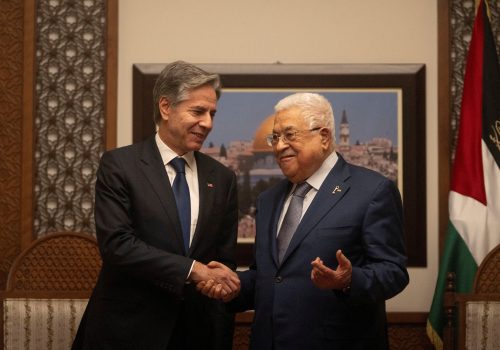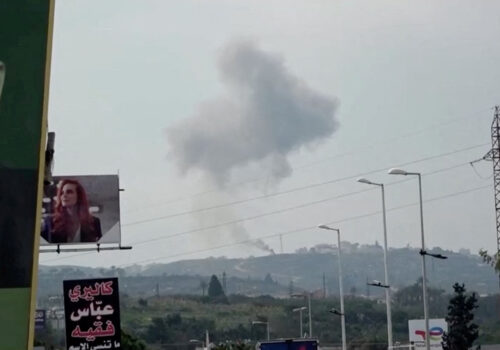Netanyahu might be losing ground, but his politics still resonate with most Israelis
On the evening of February 24, when thousands of Israelis gathered in Tel Aviv and demanded the release of the hostages and a date for elections, Lana Grichevsky—a released hostage whose boyfriend, Matan Zangauker, remains in Hamas captivity—was hit in the face by police water cannons. Other protestors were pushed back by mounted police, were shoved violently on the ground, and suffered what many Israeli journalists described as excessive use of force by the police. It resembled many of the violent incidents during the protests against the so-called “judicial reform” promoted by Prime Minister Benjamin Netanyahu’s government during 2023.
Just like then, the violence applied against the protestors had physical and verbal dimensions. The prime minister’s supporters online and in the media often attack the families of the hostages, blaming them and their supporters for “destroying Israel’s security” and even “working for the enemy.”
The question of the responsibility of Netanyahu and his government for the security breach that allowed for the Hamas massacre of mostly civilians in the Israeli south on October 7, 2023, as well as his ability to manage the war, was central to many Israelis from the very beginning. Today, when Israel is at a crossroads, this issue is more crucial than ever before. Apart from the immediate hostage deal that is currently being discussed in Cairo, Doha, and Paris, there is another grand deal on the table, which includes a vision for Gaza—the return of the Palestinian Authority to the Gaza Strip, security and financial assistance for Gaza from the Arab states and the United States, normalization between Israel and Saudi Arabia, and, possibly, a security pact between Saudi Arabia and the United States.
The deal is promoted by the United States and endorsed by the Arab world. Yet, Gaza and Jerusalem display zero interest in this deal. Hamas, as part of Iran’s Resistance Axis rejects the deal because the new security architecture in the Middle East is aimed at its eradication. Netanyahu is not interested because this deal is the antithesis of his view of Israeli and regional security, which allows for Hamas to exist but not an independent Palestinian state.
By denying any direct responsibility for the security breach on October 7, 2023—the worst in Israel’s history—Netanyahu is basically telling Israelis that his theory, which maintains the status quo and the impermissibility of the Palestinian state no matter what it takes, was correct and that the danger to the state of Israel would be even greater otherwise. If the prime minister believes that he did nothing wrong, and that the full weight of the blame lies on the shoulders of the security services (as Netanyahu and his supporters argued soon after the fateful events of October 7, 2023), then there is no need to change a thing—neither the coalition that includes extreme-right elements, nor the ideology that rejects a Palestinian state. In other words, no grand deal.
SIGN UP FOR THE THIS WEEK IN THE MIDEAST NEWSLETTER
But what does Israeli society think today about Netanyahu, his responsibility for October 7, 2023, and his ideology of accommodating Hamas while denying the Palestinians statehood? Polls show that the Israeli public is torn on many issues, but trust in Netanyahu’s government is not one of them. Israelis repeatedly show a historically low level of confidence in the prime minister, while support for his Likud party keeps dwindling.
At the same time, it’s also clear that the general public in Israel supports Netanyahu’s policies. According to a poll conducted by the daily newspaper Israel Hayom, the public is almost equally divided about “which of the two goals of the war is more important”: 46.6 percent prioritized securing the release of hostages, while 44.8 percent said “victory in the war against Hamas” is more important. However, the respondents’ answers also show that a vast majority of the public is not ready to accept the Hamas terms for the release of the abductees.
In the same poll, respondents were asked, “What is the best way to obtain the release of the hostages?” and 81.5 percent answered that “military pressure should be applied to Hamas so that it agrees to acceptable conditions for the release of the abductees.” This is something that Netanyahu and his military chiefs repeat every day.
Another survey conducted by the Israel Democracy Institute (IDI) shows that about two-thirds (63 percent) of the Jewish public do not support Israel agreeing in principle to an independent and demilitarized Palestinian state. The gap between the political camps is large: on the left, the majority (77 percent) supports a statehood agreement in principle, while only 48 percent of the center and 22 percent of the right agree. In contrast, most of Israel’s Arab citizens (73 percent) support such an agreement in principle. A tiny minority of the Jewish respondents believe that terrorism will stop if a Palestinian state is established. On the contrary, 44 percent think that a Palestinian state is “a prize for terror” and will result in more attacks.
The polls also show a stern objection to the delivery of humanitarian aid to Gaza, even if the United Nations Relief and Works Agency for Palestine Refugees in the Near East (UNRWA) is replaced, and that Israelis have a somewhat pessimistic view about the chances for a “complete victory” against Hamas in Gaza. In recent months, the Israeli government accused UNRWA of ongoing cooperation with Hamas. At the same time, the Israel Defense Forces (IDF) identified a few members of UNRWA staff who took part in the October 7, 2023 atrocities. (A few donor countries have withdrawn their support from UNRWA, and Israel has repeatedly demanded for the agency to be shut down.)
Even if the protests intensify soon—another outcome of IDI’s poll—and the country heads for elections sometime during 2024, there is a huge question mark in regard to the structural changes in Israeli political thinking and public support for unpopular moves. That includes support for the two-state solution—a consensus shared around the world, but a big no-no for almost all Israeli politicians from the extreme right to the center. To ignite a process that will allow for a realistic discussion about “the day after” in Gaza and the need to implement the two states solution, Israeli society first needs to acknowledge that the policies that Netanyahu has advanced since 2009 have failed, and to start searching for alternatives. October 7, 2023 might be the beginning of the end of Netanyahu’s era, but it will be truly finished only when his political legacy of maintaining the status quo is gone.
Ksenia Svetlova is a nonresident senior fellow with the Atlantic Council’s Middle East Programs, and is the director of the Israel-Middle East Relations Program at Mitvim. Follow her on X: @KseniaSvetlova.
Further reading
Wed, Dec 6, 2023
The Israeli right-wing is determined to prevent any discussion of a future Palestinian state
MENASource By Ksenia Svetlova
Uri Israel is not the only right-wing movement that speaks and acts against the Palestinian Authority and warns about the possible menace of its return to the Gaza Strip.
Fri, Mar 1, 2024
As fighting along the Lebanon-Israel border escalates, diplomats scramble to head off a war
MENASource By Nicholas Blanford
The chances of calming the Lebanon-Israel border will be that much greater if a temporary ceasefire in Gaza evolves into a permanent ceasefire.
Thu, Feb 22, 2024
The future of Saudi-Israeli relations is a balancing act between Palestinian and regional interests
MENASource By R. Clarke Cooper
Any credible movement to formalize bilateral relations between Riyadh and Jerusalem cannot ignore what the Saudis have consistently stated about the two-state solution.
Image: An Israeli horse mounted police officer rides into a crowd of protesters during the demonstration. About 50 protesters gathered in support of Prime Minister Netanyahu as thousands of Israelis protested in Tel Aviv on Saturday, against Israeli Prime Minister Benjamin Netanyahu and his government, calling on the government to reach a deal of swapping hostages held by Hamas and Israeli. via Reuters


